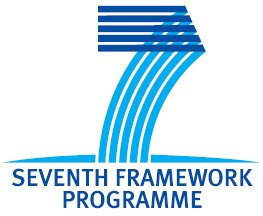Service-oriented Operating Systems
Processor and network architectures are making rapid progress with more and more cores being integrated into single processors and more and more machines getting connected with increasing bandwidth. Processors become heterogeneous and reconfigurable, thus allowing for dynamic adaptation to specialised needs. In future, thousands of billions of devices may be connected to form a single computing unit.
No current programming model is able to cope with this development, though, as they essentially still follow the classical van Neumann model. Furthermore, complex, non-aligned middlewares and operating systems render distributed applications unnecessarily inefficient. In order to realise efficient programmability of terascale devices by experts and average developers equally, a complete new approach to handling these types of devices across all layers is required:
The S(o)OS project addressed future distributed systems on the level of a holistic operating system architecture by drawing from Service Oriented Architectures and the strength of Grids. This decouples the OS from the underlying resource infrastructure, thus making execution across an almost unlimited number of varying devices possible, independent from the actual hardware.
Read more...
Project News |
Related News |
Events |
An experimental comparison of different real-time schedulers on multi-core systemsThe global deadline scheduler patchset for Linux SCHED_DEADLINE (implementing Earliest Deadline First and Constant Bandwidth Server real-time scheduling algorithms) has been exploited to investigate on pros and cons of different approaches to real-time scheduling on big multi-core systems. Researchers at SSSA published a journal paper in which an experimental comparison among the Rate Monotonic (RM) and Earliest Deadline First (EDF) multi-core real-time schedulers is performed, with a focus on soft real-time systems. The designer of a real-time system often needs to compare different available real-time scheduling strategies, in terms of their impact on the performance of the hosted applications. Read more...SCHED_DEADLINE at Linux Plumbers Conference '12The Linux Plumbers Conference is a forum, with strong technical focus, that spurs communication and problem-solving for system-wide issues crossing project and business boundaries. Every year it brings together highly skilled Linux developers from all over the world setting the ground for next year advancements of the low level Linux infrastructure. This year the S(o)OS project has participated with a talk by Juri Lelli from SSSA with title “SCHED_DEADLINE (what it does and doesn't do.. yet)”. Read more...Programming Large Scale Embedded SystemsThe memory wall problem cannot be overcome by new operating systems or infrastructures alone, if the application is not properly prepared for it, i.e. if the data dependencies are not properly identified and treated in the program itself. Classical programming models are not aligned to this problem and hence make it difficult for compilers and the operating system to properly analyse the data dependency and to adjust accordingly. Within the S(o)OS project, a new programming concept exploiting data flow information inherent to mathematical description has been proposed to address this problem. Read more...Implementing S(o)OSThe S(o)OS project primarily focused on generating a suitable architecture for future operating system, but did not have the resources to implement a working kernel. Instead, it generated the necessary set of algorithms, interfaces and protocol descriptions, preparing an implementation as much as possible and allowing evaluation of behaviour and performance. Read more... |
Polca - Programming Large Scale Heterogeneous InfrastructuresPolca (Programming Large Scale Heterogeneous Infrastructures) is a project proposal, pending of aproval, submitted to call 10 of ICT-2013-3.4, “Advanced Computing, embedded and Control Systems” as an approach to bring together High Performance and Embedded Computing. Read more...The JUNIPER EU project is startedJUNIPER (Java Platform for High Performance and Large Scale Real-Time Data) is a STREP project of the FP7 programme of the EU. The aim of the project is to conduct research on innovative technology for supporting Real-Time Big Data applications. Read more...LLVM 3.3 new featuresNext week will be released the version 3.3 of LLVM and CLANG infrastructure and it includes new exciting features. Read more...Next generations consoles to use hybrid architectures with unified memory space.The next generation of high performing gaming consoles, the PlayStation 4 and Xbox One, will both use a hybrid architecture using a semi-custom SoC design based on AMD's modules. Read more... |
S(o)OS will participate in CASTNESS 2013S(o)OS will participate in the collaboration workshop on "Computing Architectures, Software tools and nano-Technologies for Numerical and Embedded Scalable Systems" (CASTNESS'13) that will take place on June 28, 2013 in Barcelona, putting together the European Projects belonging to the TERACOMP Future and Emerging Technologies (FET) call on terascale systems. Read more...HPDC 2012 Call for PapersThe 21st International ACM Symposium on High-Performance Parallel and Distributed Computing (HPDC'12) is calling for papers and workshop proposals. ACM/IEEE International Symposium on Networks-on-Chip (NOCS)The Fifth ACM/IEEE International Symposium on Networks-on-Chip (NOCS) will be held on May 1-4, 2011, in Pittsburgh, Pennsylvania, USA. Read more... Call for Participation: AHM2010AHM2010 is a dedicated workshop on trends, issues and challenges in future high-end computing. The workshop was held in Cardiff, UK, in September 2010. Check out the workshop report page for more information about the workshop outcomes. Read more... |







